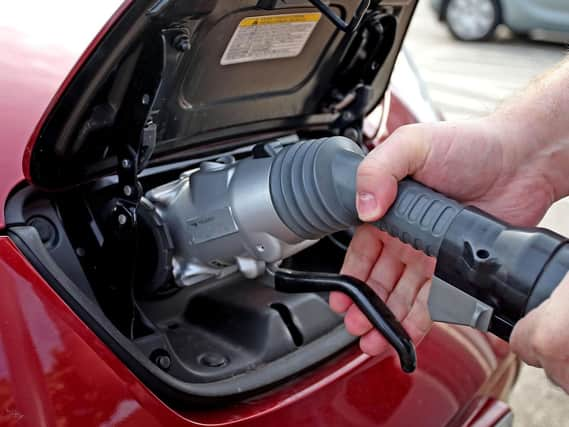Bring forward ban on sales of new petrol and diesel cars to 2032, says committee led by Leeds MP Rachel Reeves


The parliamentary Business Committee, led by Leeds West MP Rachel Reeves, warned that Ministers must also “get a grip” and tackle a lack of charging points which act as a barrier to people buying electric cars.
The Government has outlined a goal for an end to sales of new “conventional” petrol and diesel cars by 2040 as part of efforts to clean up transport which causes air pollution and is the worst sector for carbon emissions in the UK.
Advertisement
Hide AdAdvertisement
Hide AdBy 2040, all new cars and vans should be “effectively zero-emission”, Ministers have said. But the committee warned that the Government’s targets are “vague and unambitious”, and the lack of clarity on which vehicles will and will not be sold in 2040 is “unacceptable” for an industry trying to make investments.


According to a Yorkshire MEP, the Government's approach is more pragmatic, as policy-makers should not be banning types of car until a suitable alternative is ready and available to take its place. John Procter said the technology for low-emission vehicles was not yet ready or affordable.
A range of cars are beginning to replace conventional vehicles from electric models powered by a battery charged from the grid to hybrids with an engine and a small battery which charges from braking but cannot be plugged in.
Advertisement
Hide AdAdvertisement
Hide AdA clear UK target is needed for new cars and vans to be “truly zero-emission” - and it should be brought forward to 2032 to make the UK a world leader, the MPs said.
The committee criticised the Government for leaving delivery of a national charging network to local authorities and private companies.
Ms Reeves, a Labour MP, said: “The Government cannot simply will the ends and leave local government, or private companies, to deliver the means.
“The Government needs to get a grip and lead on co-ordinating the financial support and technical know-how necessary for local authorities to promote this infrastructure and help ensure that electric cars are an attractive option for consumers.”
Advertisement
Hide AdAdvertisement
Hide AdYorkshire MEP John Procter said the Government's 2040 target was a "more pragmatic approach, to encourage the uptake of low emission vehicles amongst consumers".
The Conservative former Leeds councillor, who has been involved in the drafting of European Union legislation on vehicle emissions, told The Yorkshire Post: "Imposing a ban on a product that people’s jobs and businesses currently rely upon, without any evidence yet, of any take-up rates, battery degradation rates or residual values, is not good policy or good for consumers, as we saw recently with 'dieselgate'."
"The technology, as much as I would like it to be, is simply not quite ready, to tie ourselves to strict prohibition timelines, which will invariably have to be rolled back further down the line.
"Nor is the technology affordable yet, which would see a ban hurt many low income consumers who cannot afford to pay the premiums for low emission electric vehicles.
Advertisement
Hide AdAdvertisement
Hide Ad"The affordability of low-emission vehicles, played a significant part in the debate leading up to the EU’s equivalent legislation, setting vehicle emission targets for all new cars and vans, which only asks for EU car manufacturers to produce 40 per cent low emission vehicles by 2030.
"Similarly, this is not a ban; it is a target, which can adjusted further down the line, as the technology develops."
Responding to the report, a Government spokesman said: “Our Road to Zero Strategy outlined our ambition for the UK to be the best place in the world to build and own an electric vehicle.
“As part of this, we want between 50 per cent and 70 per cent of new car sales to be ultra low emission by 2030, and for all new cars and vans to be effectively zero emission by 2040.
“And we also outlined measures to bring forward a major uplift in electric vehicle charging infrastructure, paving the way for the widespread adoption of ultra-low emission vehicles.”